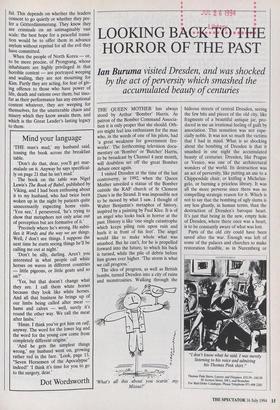Mind your language
'THE man's mad,' my husband said, tossing the book across the breakfast table.
'Don't do that, dear, you'll get mar- malade on it. Anyway he says specifical- ly on page 21 that he isn't mad.' The book on the table was Nigel Lewis's The Book of Babel, published by Viking, and I had been enthusing about it to my husband, who had twice been woken up in the night by patients quite unnecessarily expecting home visits. 'You see,' I persevered, 'he's trying to show that metaphors not only arise out of perception but are formative of it.' 'Precisely where he's wrong. He subti- tles it Words and the way we see things. Well, I don't see things. I suppose the next time he starts seeing things he'll be calling me out at night.' 'Don't be silly, darling. Aren't you interested in what people call white horses on waves in different countries — little pigeons, or little goats and so on?'
'Yes, but that doesn't change what they are. I call them white horses because they look like white horses. And all that business he brings up of our limbs being called after meat — hams and calves — well, surely it's round the other way. We call the meat after limbs.'
Ilmm. I think you've got him on calf, anyway. The word for the lower leg and the word for the young cow come from completely different origins.' 'And he gets the simplest things wrong,' my husband went on, growing rather red in the face. 'Look, page 13, "Seven Horsemen of the Apocalypse" indeed!' I think it's time for you to go to the surgery, dear.'
Dot Wordsworth


















































 Previous page
Previous page